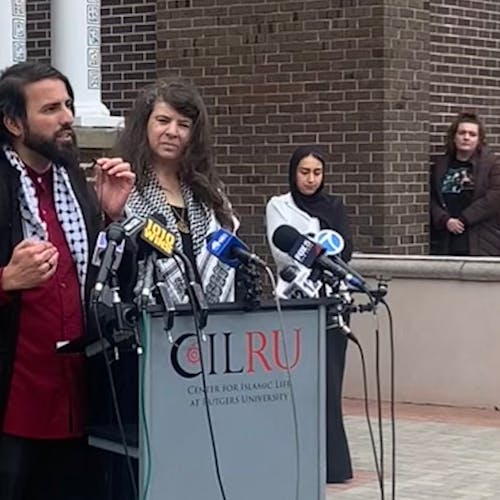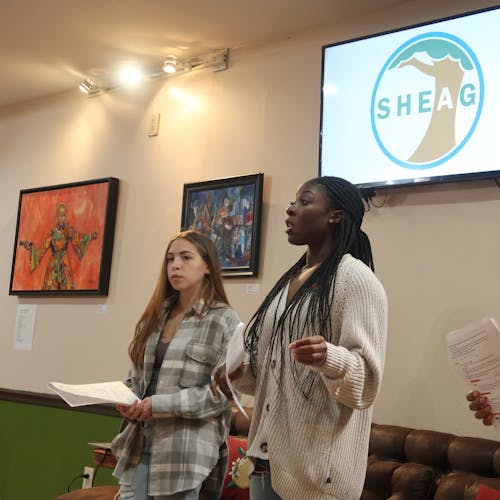Rutgers' greek community marches to combat sexual assault epidemic

Students part of Rutgers' greek life family marched in honor of sexual assault survivors last night –– not only to combat sexual violence, but to also battle the growing public perception of greek life as a facilitator of rape culture and binge drinking.
Co-hosted by Delta Sigma Iota fraternity and Phi Sigma Sigma sorority, the greek community invited marchers to gather at Brower Commons on the College Avenue campus to unify against sexual assault on campus, an issue so systemic that the White House organized a task force in 2014 to ensure justice for survivors and ramp up prevention efforts at universities across the country.
As part of the task force, the United States Justice Department partnered with Rutgers University’s Center on Violence Against Women and Children to pilot, evaluate and further refine the campus climate survey, which the White House hopes to use to determine the extent of the problem on individual campuses.
Rutgers, in response to negative publicity surrounding greek life that resulted from the death of Caitlyn Kovacs in October and a recent hazing incident that resulted in a Rutgers student being treated for alcohol poisoning, banned house parties for all 86 greek organizations until the end of the current spring semester.
The Star-Ledger published an editorial, titled “Rutgers would be better off without frats. Period.” on April 11 lauding the University for “cracking down” on fraternity and sorority parties.
“Let’s face it: The entire Greek system needs to be yanked out by its roots –– not just at Rutgers, but everywhere,” the editorial reads. “The real problem is that the benefits of the Greek system are vastly outweighed by its downsides; not just binge drinking and sex assaults –– deadly falls out of windows and hazing.”
But the University’s greek community demonstrated that it is no exception to Rutgers’ approach to abolishing campus sexual assault, rallying supporters for the silent procession down College Avenue.
Vidhaath Sripathi, social chair of Delta Sigma Iota, said that in light of all the negative perception of greek organizations both at Rutgers and in national media, fraternities and sororities at Rutgers wanted to come together to demonstrate the positive impact they have on the University.
“The epidemic of campus sexual assault pervades all aspects of college life, and we think this is a great way to break the silence on the issue and gives survivors the confidence to speak out,” the School of Engineering sophomore said.
Prior to the march, Phi Sigma Sigma Vice President Julia Palazzo said the collaboration between Rutgers’ fraternities and sororities was about more than just attempting to be more likable in the public eye, emphasizing that sexual violence is a problem that Rutgers greek life cares about.
“It’s not new that we’re doing something good for the community, that’s what we’re all about,” she said. “We don’t focus all our attention on being social ... We do care about the community, we care about giving back and having a (positive) presence on campus.”
Handing out flyers that provided statistics such as “One in five college women are at risk of being sexually assaulted” and contact information for Rutgers Violence Prevention and Victim Assistance (VPVA), brothers and sisters led marchers down College Avenue and back around Easton Avenue to Brower Commons, where School of Engineering junior Jacqueline Ramos shared her experience with sexual violence in front of the crowd.
While walking to her home on Douglass campus one evening, Ramos, a sister of Phi Sigma Sigma, said she was approached by a strange older man, who proceeded to forcibly kiss and grope her.
Ramos was able to fight off her attacker and escape the situation, but kept silent about her assault, brushing it off as insignificant and putting the responsibility on herself to “be more careful walking home at night.”
She said she later realized that she should not have to fear walking on her campus alone, and that by sharing her experience, she could be an agent to break the silence on sexual violence.
“I feel empowered,” she said following her speech. “It was time people heard my story, and hopefully it inspires others.”



